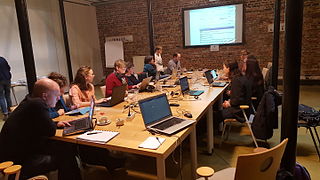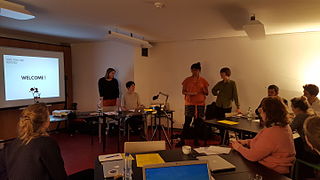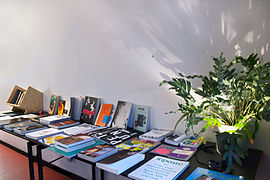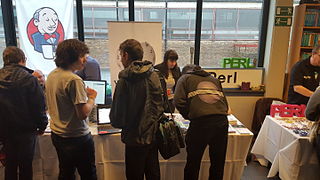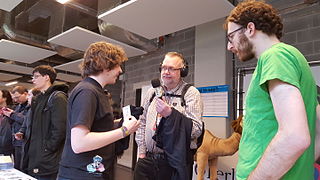Newsletter/2016-04 news/long
Wikimedia Belgium Newsletter - April 2016
Please find the newsletter of April 2016 from Wikimedia Belgium below.
The newsletter covers the period of January to March 2016.
Rue du Trône 51
1050 Brussels
info@wikimedia.be
www.wikimedia.be
be.wikimedia.org
https://twitter.com/Wikimedia_BE
Upcoming events
[edit]- 4-16 April 2016: Writing weeks about the Brussels Capital Region to describe this region better on Wikipedia. You are welcome to participate in any language Wikipedia you like. During the writing weeks also writing sessions on location are organised and are open to anyone. Read more >>>
- July-August 2016: Wiki Loves Art photo contest about Belgian art
- 19-21 August 2016: WikiConvention francophone in Paris
- September 2016: Wiki Loves Monuments photo contest about cultural heritage sites in Belgium and Luxembourg
Short news
[edit]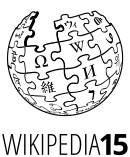 |
- On 15 January 2016 Wikipedia turned 15. With this occasion we got multiple press inquiries and media attention in the Belgian press.
- On 2 February, Jimmy Wales, the founder of Wikipedia, received a doctoratus honoris causa from the Université catholique de Louvain (UCL).
- On 25 February a photography hackathon was organised by the Katholieke Universiteit Leuven and Europeana at FabLab, where WMBE members Stefano Caneva and Derek v. Giroulle gave a presentation about Wikimedia.
- On 28 February a Wikimedia presentation was given at Université catholique de Louvain (UCL) for non French native people by M0tty.
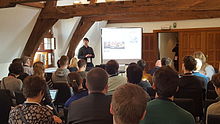
- On 29 February the conference Open Belgium was organised in Antwerp by Open Knowledge Belgium. There two presentations related to Wikimedia were given: one about Wiki Loves Art by Romaine, and one about Linked Open Data publications by Flemish museums through Wikidata by Packed vzw.
Association
[edit]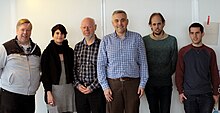
On 23 January 2016 Wikimedia Belgium had its annual general assembly. There the members chose a new board for our association. Three board members leave (due time constraints):
- MADe - our hard working president who focussed on the goal of founding Wikimedia Belgium and he did!
- M0tty - our vice president who is one of the founders and collaborated with the Mundaneum.
- Dimi z - our international liaison and one of the founders and is the face to the European politicians in Brussels.
All three remain active for Wikimedia Belgium in an advisory role for the board. Thank you MADe, M0tty & Dimi z for your work the past years!
Two board members come in:
- SPQRobin - member of the Wikimedia language committee, developer, and long term Wikipedia editor.
- Lfurter - graphic designer, researcher, curator, and organiser of multiple Wikimedia events.
Also a new president of our chapter has been elected. This is now Geertivp. He had in the board the role of secretary, which included a performance on Belgian television in January. SPQRobin takes over the role of secretary from Geert.
More information about the General Assembly can be found in the minutes.
Education
[edit]
The Wikiducation.be project is ready for launch and pilots in Dutch.
Wikiducation focusses on the education sector, the objective is to use Wikipedia (or one of the sister projects) actively in the classroom. Students are encouraged to actively contribute to Wikipedia in the context of their classwork. They write, improve or illustrate articles in Wikipedia. We target the senior years of our secondary schools and higher education.
Wikimedia Belgium actively supports and assists the pilot projects. Wikimedia volunteers will educate lecturers and students and provides on-campus support and formation for student campus volunteers. During the academic year 2016-17 we can accommodate and support pilots on 4 campuses for a maximum of 6 pilot trajectories in the Dutch speaking part of Belgium (and in English). Also in the sectors of adult and cultural education we can support 2 pilot projects.
Wikiducation in the French speaking part is not yet ready for pilots, so Wikimedia Belgium actively searches for volunteers that can translate documentation in French and want to be educated as wiki-education volunteer.
Interested people can contact Wikimedia Belgium via our website www.wikimedia.be.
Linked Open Data through Wikidata
[edit]
Packed vzw started, with support from Wikimedia and its users, the project Linked Open Data via Wikidata in what cultural institutions start working with Wikidata. The project exists out of:
- A white paper is written about Wikidata. The document describes how data can be added to Wikidata, what the benefits are, best practices, user cases, and more.
- Participating partner organisations provide a CSV dataset with their art works.
- This dataset will be added to Wikidata under a CC0 license.
- The partner organisations receive back an RDF export with their data.
Also three YouTube videos have been created to explain the project:
The first meeting was at 28 October 2015 where institutions got an introduction in the project.
On 29 January 2016 a second meeting was organised about Linked Open Data via Wikidata. During the first part of the day the project results were shared with the participating organisations. In the second part of the day a hands on Wikidata workshop was given to these institutions. The participants learned how they can edit Wikidata, how to add their own information, what information can be added, and more.
The project resulted in a white paper being written, see: Flemish art collections, Wikidata and Linked Open Data/Whitepaper.
-
Wikidata editing session for institutions
Packed vzw is in Flanders the centre of expertise "in centring the development of knowledge, experience and expertise regarding digitisation and digital archiving, and in spreading the acquired knowledge, experience and expertise". They work together with the various institutes and organisations in Flanders that have the intention to take care of cultural heritage. (more info)
Wiki Loves Art
[edit]
Wiki Loves Art is a photo contest about Belgian art in what we invite the public to take photos of art in participating organisations with an art collection. The contest takes place during July and August 2016.
For the contest we have created a dedicated website at www.wikilovesart.be.
In the past weeks we have written an invitation for participating organisations, that now is now being sent out to institutions. The invitation can be found at: Wiki Loves Art/invitation.
For the project we are also looking for volunteers who can help us with the organisation of the project. If you want to help, let us know!
Writing weeks Brussels
[edit] |


After some acts of hate in Brussels in March, in April it is again time for love. On 4 to 17 April 2016 the writing weeks about Brussels are organised. During these two weeks anyone is invited to write on Wikipedia about the Brussels Capital Region in any language you like to have this region better described on Wikipedia.
In the coming weeks multiple writing sessions on location will be organised, and you are welcome to join them! There you have the opportunity to write in any language you like and to meet other people writing on Wikipedia. This is also the opportunity to ask experienced Wikipedia editors some questions and to get to know Wikimedia Belgium.
To prepare for the writing sessions, we organised together with the Flemish Community Commission multiple training days where staff of the libraries in Brussels learned how Wikipedia works, what they need to think of with writing an article, and an understanding of what Wikipedia and Wikimedia are.
The sessions will be organised at various locations, including:
| Date | Venue | Time | Address |
|---|---|---|---|
| 5 April 2016 | 14.00-19.00 | library of Koekelberg | Rue de l'Eglise Saint-Anne 63, 1081 Koekelberg |
| 6 April 2016 | 14.00-17.00 | library of Koekelberg | Rue de l'Eglise Saint-Anne 63, 1081 Koekelberg |
| 7 April 2016 | 10.00-13.00 | library of Jette | Place Cardinal Mercier 6, 1090 Jette |
| 7 April 2016 | 10.00-15.00 | library of Woluwe-Saint-Pierre | Avenue des Grands Prix 63, 1150 Woluwe-Saint-Pierre |
| 9 April 2016 | 10.00-13.00 | Muntpunt library | Place de la Monnaie 6, 1000 Brussels |
| 11 April 2016 | 14.00-19.00 | library of Koekelberg | Rue de l'Eglise Saint-Anne 63, 1081 Koekelberg |
| 12 April 2016 | 12.00-17.00 | library of Anderlecht | Rue Saint-Guidon 97, 1070 Anderlecht |
| 12 April 2016 | 17.00-23.00 | VUB, building E.1 | Boulevard de la Plaine 2, 1050 Ixelles |
| 13 April 2016 | 17.00-23.00 | VUB, building E.1 | Boulevard de la Plaine 2, 1050 Ixelles |
| 14 April 2016 | 10.00-13.00 | library of Jette | Place Cardinal Mercier 6, 1090 Jette |
| 14 April 2016 | 17.00-23.00 | VUB, building E.1 | Boulevard de la Plaine 2, 1050 Ixelles |
More information and participation is available via Writing week/Brussels.
Other
[edit]Public Domain Day
[edit]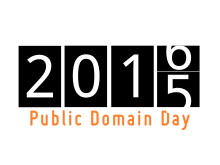
On the first day of the year we celebrate Public Domain Day as on this day the copyrights on many works expire and those works enter into the public domain. As a result on Wikimedia Commons hundreds of files are restored, and these files now can be re-used in Wikipedia again. View this year's files >>>
Also the diary of Anne Frank entered into the public domain. Sadly, as a result of Wikimedia's servers are located in the United States, the diary is an unfortunate example of the overreach of the United States’ current copyright law, which caused the Wikimedia Foundation to remove the Dutch-language text of The Diary of Anne Frank from Wikisource. (explanation) In the United States, the text of the diary remains copyrighted until 2042. The text is however in the mean while available at Wikilivres at Het Achterhuis (Anne Frank).

To celebrate Public Domain Day 2016, on both 16 January and 25 January a Public Domain Day Celebration was organised in Brussels.
- On 16 January a celebration was organised by the Royal Library of Belgium (KBR), the Research Centre in Information, Law and Society CRIDS, Nova Cinema, the association for Arts and Media Constant, and Wikimedia Belgium. This year the particular accent was on the Diary of Anne Frank and the attempts of the right holders to prolongate its copyright protection, and on the work of Béla Bartók. (More information)
- On 25 January the Public Domain Day Celebration lunch was organised by COMMUNIA, hosted by MEP Julia Reda in the European Parliament in Brussels. The event started with a talk by Julia Reda. After the host multiple people followed, who spoke about their experiences with copyright, afterwards followed by an opportunity to talk and discuss.
Links:
- The talk of Julia Reda on Vimeo
- Public Domain day 2016 at the European Parliament
- COMMUNIA hosts public domain celebration in the European Parliament
Just For The Record
[edit]


Just For The Record is a project addressing how gender is represented in new media and writing/publishing tools like Wikipedia, and what influence this has on the way history is recorded. To address gender issues Just For The record organised a series of events in Brussels.
|
Just For The Record is a project addressing how gender is represented in new media and writing/publishing tools like Wikipedia, and what influence this has on the way history is recorded. With the importance that such platforms as Wikipedia have gained in our society, and the new writing and publishing tools they propose, it is becoming clear that history is being written down once again. Therefore it is of great concern when studies reveal that only 8.5 to 22.7% of Wikipedia’s contributors are women. This problem was identified by the community itself as Gender Bias. Despite their efforts to come up with solutions to live up to their motto “the free encyclopedia that anyone can edit”, Wikipedia’s contributors are still predominantly male. Moreover, the contents published also show partial gender representations. As a symbolic example, the article “Heroines” is automatically redirected to the article “Hero”, and its emblematic figures are mostly male. Next to the issues of authorship and subject matters, the writing style and structure can often be problematic. A classic example of this is the amount of articles about women that starts with “this woman was the sister/wife of this famous man” in their first or second sentence. — source
|
To address these issues Just For The Record organised a series of events in Brussels starting on 15 January 2016. The topic of the first event was Heroines. During Heroines, these observations were taken as the point of departure for lectures and discussions, and intervention—the day includes a crash course in Wikipedia editing. The event included a presentation by Catherine Lenoble on ‘Heroines (disambiguation)’ and an intervention by Clara Thomine.
At 27 February 2016, the second project day of the project Just For The Record was organised. The topic of this event was Gender Redirect. During the event, also at this day these observations were taken as the point of departure for lectures and discussions, and intervention—the day includes a crash course in Wikipedia editing. The event included a presentation by Femke Snelting and a performance by Frau Picha.
On 8 March the team of Just For The Record was present with a stand during International Women's Day at Muntpunt, the library, meeting place and activity centre in the heart of Brussels. There visitors from the library were informed about the project and the problems Wikipedia faces with gender neutrality. The project received much interest and positive reviews from the library's public.
During the Ladyfest 2016 on 18-20 March in Brussels, the team of Just For The Record gave two presentations about their project.
|
Ladyfest is originally an American project that was created in order to react to the invisibility of women on the artistic and musical scene. It has grown into an international non-profit event that takes place in more than 50 cities all over the world. — source
|
Links:
-
Welcome!
-
Temporary library
-
Working on Wikipedia
FOSDEM
[edit]
In the last weekend of the first month, 30-31 January, the annual conference for free and open-source software development, FOSDEM, was organised again in Brussels. Wikimedia had a stand at the conference, organised by Wikimedia Belgium, Wikimedia Deutschland (WMDE) and the Wikimedia Foundation. At the stand we had various materials from the Wikimedia movement and the focus of this year's stand was mainly on informing the public about Wikidata and its possibilities. The organising team was especially strengthened by some great WMDE staff that supplied information materials and more, as well as their great presence at the stand.
During the conference multiple presentations were given about certain topics in the Wikimedia movement, including about the Wikidata article placeholder, and about the Free Knowledge Game Jam.
From Wikipedia/Wikidata/Wikimedia/MediaWiki in total more than 15 people were present during the conference, coming from Albania, Belgium, France, Germany, Italy, the Netherlands, the UK, and the US and all together we had a great conference with good talks.
FOSDEM shows that it is important for the Wikimedia movement to reach out to all kinds of parties and inform them about the many possibilities there are in the Wikimedia movement, with MediaWiki, Wikidata, Wikipedia and more. With this conference the app makers and other software developers.
With the conference, also the presence on Wikidata of FOSDEM itself has been expanded.
-
Poster about Wikidata
-
Explaining what Wikidata is
-
Slides about the Wikidata article placeholder
-
Slides about the Free Knowledge Game Jam
-
FOSDEM podcast about Wikidata


